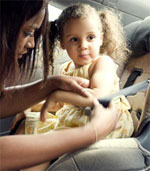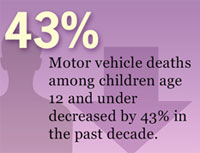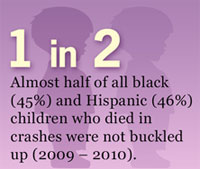 Reminder:
Check Child Safety Seats
Reminder:
Check Child Safety Seats
Posted February 18, 2014 06:55 am
TALLAHASSEE, FL - Your car will remind you to check the oil, but experts say it's also important to check what's carrying your most precious cargo. The CDC says in a new report that child deaths in car crashes have declined by 43 percent over ten years, but there's still work to do, because in a third of accidents that claimed the life of a child age 12 or younger, the child was not properly restrained.
According to Dr. Erin Sauber-Schatz, Transportation Safety Team Lead in the Division of Unintentional Injury Prevention at the CDC, parent education and car seat distribution help make sure more children are buckled up properly, but Florida could do more with a stricter law.
 "Child
passenger restraint laws that increase the age for car
seat or booster seat use result in getting more children
buckled up," she said.
"Child
passenger restraint laws that increase the age for car
seat or booster seat use result in getting more children
buckled up," she said.
The recommendation is a law to require child safety-seat
use through age eight. Florida now requires children be
in child safety seats until they are three.
 The
CDC report shows that about 12 children die in car
crashes each week in the United States.
The
CDC report shows that about 12 children die in car
crashes each week in the United States.
Health-care providers also play a role in making sure
children are safe in cars and trucks, with Sauber-Schatz
suggesting a conversation in the doctor's office.
"And they can counsel parents and caregivers at each
well-child checkup to use age- and size-appropriate car
seats, booster seats and seat belts on every trip."
In general, the CDC recommends that all children should
ride in the back seat until age 13. Rear-facing car
seats are for infants up to age two. Front-facing seats
are suitable from two to five. And booster seats are to
be used until a child has grown enough for a seat belt
to fit properly across the chest and lap.
Photos/graphics and links added by the Observer
Photos/graphics: CDC
